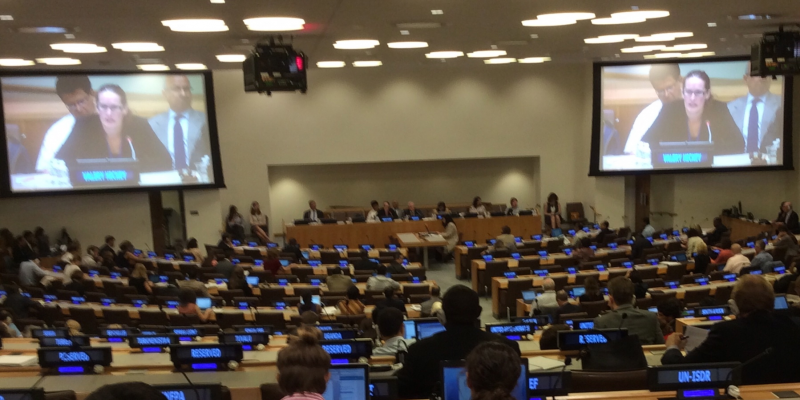
The second official meeting of the High-level Political Forum on Sustainable Development (HLPF) is taking place at the United Nations in New York this week, and a presentation on natural capital accounting (NCA) described how it can play a role in making the post-2015 goals monitorable and achievable. The HLPF was created at the Rio+20 conference in 2012.
The theme for the eight-day meeting, being held June 30-July 8, 2014, under the auspices of the Economic and Social Council (ECOSOC), is "Achieving the Millennium Development Goals and charting the way for an ambitious post-2015 development agenda, including the sustainable development goals".
The HLPF is the main United Nations platform that is pressing for action on sustainable development at the top political level. The forum will meet every four years at the level of Heads of State and Government under the auspices of the General Assembly, and every year under the auspices of the Economic and Social Council.
How NCA Can Contribute to the Sustainable Development Goals
The Sustainable Development Goals (SDG’s) will build upon the Millennium Development Goals (MDGs) to ensure basic human needs and promote growth that is sustainable. The new set of goals, targets and indicators is set to be adopted at a UN Summit in September 2015.
In her presentation at the forum, Natural Capital Accounting for Sustainable Development, Valerie Hickey, Practice Leader for Environment and Natural Resources at the World Bank, described how NCA can contribute to the post 2015-development agenda by “moving the world beyond a GDP matrix to focus on all assets that a country needs for long-term growth and well-being.”
“Most of the 2015 targets are likely to have goals. And for these goals to be real, they have to be measurable and have meaningful indicators,” said Hickey. “NCA provides an already agreed framework using the (System of Environmental-Economic Accounting) SEEA to plan and develop indicators that countries may agree to achieve as well as a framework to monitor progress.” She also added: "NCA is one tool that can help make sure we are not making progress against one SDG by liquidating another."
NCA straddles all three pillars of sustainable development (economic development, social development and environmental protection) and is a tool that can measure and value natural resources with all the services they provide—such as air and water filtration, flood protection, carbon storage, pollination for crops, and habitat for fisheries and wildlife. Data on the stocks and flows of natural resources are used to construct the accounts.
“The HLPF was right to call for a global “data revolution.” This time we need to go a step further – it is not just data that is produced by statistical offices but data that is analyzed and used by policy makers in real time. Data and evidence has to be systematic, regular and easily digestible,” said Hickey at the presentation, which was attended by more than 80 member states and over 20 UN agencies.
Hickey stressed that a forum like the HLPF is vital to garner the political will and full engagement of not just environment ministries but also development, planning and finance ministries.
Broad Country Support for NCA Initiative
A total of 70 countries have declared their support to integrate the value of natural resources into development planning and national economic accounts. The World Bank Group is helping countries make that happen through the Wealth Accounting and Valuation of Ecosystem Services (WAVES) Global Partnership.
The WAVES partnership includes core-implementing countries such as Botswana, Colombia, Costa Rica, Guatemala, Indonesia, Madagascar, Rwanda and the Philippines—and demand from other countries for WAVES’ support is growing.
At the one-day launch of the forum last September, World Bank President Jim Yong Kim urged presidents, prime ministers, and other high‐ranking officials to sustain momentum on NCA since Rio+20, continue to build the coalition of countries that are pushing the practice forward, and that natural capital accounting should be “one important new tool in the global toolbox” to address climate change, poverty eradication and economic development.
In January, 2014, a side event on NCA took place at the Open Working Group on Sustainable Development Goals—the UN's principal negotiating forum for drawing up a first draft of the new goals, targets and indicators for international development. Nearly 100 participants attended the side event, including ambassadors, ministers, delegates, and representatives of major groups, including youth and business.
